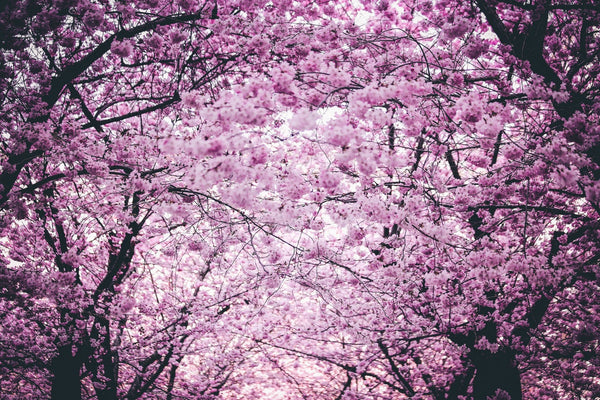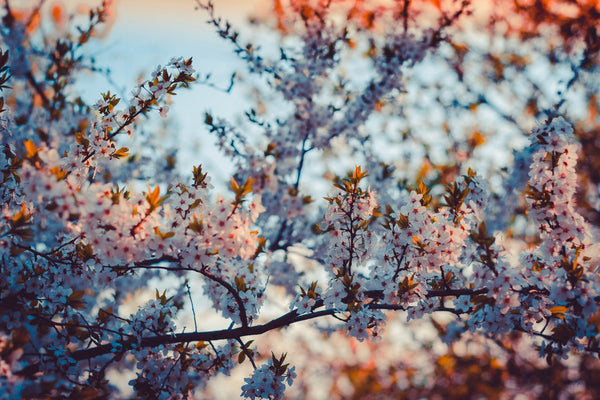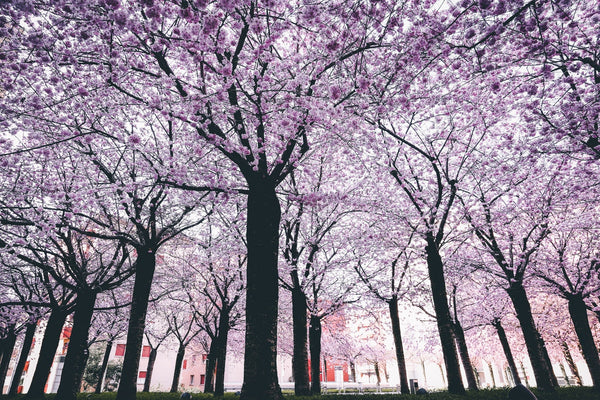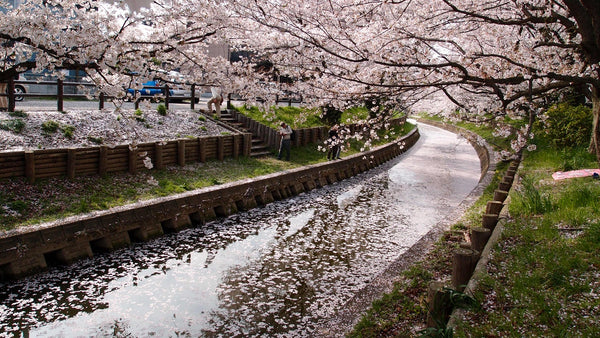Spring is on the horizon and with that comes colorful blooms, from vibrant pinks to deep purples and beyond. But one of the most iconic blooms? The Flowering Cherry.
And aside from its good looks, the Flowering Cherry Tree brings a ton of benefits to your landscape: Longer blooming time, cold hardiness, strong and easy growth, just to name a few of its one-of-a-kind features. With our buying guide tips and tricks, planting and growing a Flowering Cherry of your own is even more effortless. Check out why we love the Flowering Cherry below...and why it's a must-have for your own landscape!

Most Popular Flowering Cherry Tree Varieties
Though each Flowering Cherry variety is known by its enduring flowers, rich color and easy growth, there are multiple subtypes, each with a touch of unique flair. From the deep tones of the Kwanzan to the weeping branches of the Pink Weeping Cherry, there's a variety for any landscape need.
1. Kwanzan Cherry
Easily the showiest of all Flowering Cherries, the Kwanzan's blooms aren't just pink but double pink, meaning you get twice as many petals and twice as many blooms.
Plus, the Kwanzan Cherry Tree blooms in large clusters of three or five flowers, making them the thickest of all pink flowering trees with a look similar to carnations.
2. Autumn Cherry
The Autumn Cherry boasts semi-double blooms as well, bursting with color in the springtime. But what makes this tree so unique is that its flowers appear again in the fall and during warm winters, when other trees are usually dormant or losing their leaves.
3. Yoshino Cherry
The Yoshino is set apart by its stunning white blossoms, an abundance of which emerge in the spring.Even better is its exotic branching pattern complemented by its pure white cloud of delicate flowers. Basically, the Yoshino is like springtime on parade, especially since it's drought resistant and adapts well to an array of soil types.
4. Pink Weeping Cherry
Not only does this Flowering Cherry varieties explode with classic color, but it also features branches that grow upright and then gracefully cascade. And it fits right into small spaces or large landscapes, reaching a maximum possible height of 30 feet.

5. Okame Cherry
When you think cherry blossom, you think Okame - this flowering beauty is the star of the annual Cherry Blossom Festival in Washington, D.C.! With profuse pink flowers and a sweet fragrance, this tree is one of spring's earliest bloomers, and a perfect landscape addition.
How to Plant a Flowering Cherry Tree
Luckily, once you've selected your Flowering Cherry Tree, it doesn't take much to start. Start by choosing an area with full to partial sun and well-drained soil. When we say full to partial sun, we mean any locale that receives about 4 to 8 hours of sunlight per day. As long as your Flowering Cherry gets adequate sunlight and drainage, you're good to go.
Planting Cherry Blossom Trees
Once you've scouted your chosen area and selected your favorite Flowering Cherry, it’s easy to plant your trees.
Dig your hole just as deep and twice as wide as the tree's root ball. You’ll want to keep the crown (the top) of the root ball roughly an inch above the surrounding soil's level. Add a bit more dirt to the mound underneath if necessary.
After placing your tree and loosening its roots a bit, back fill your hole with soil without covering the crown. Then, water to settle the roots. When the planting process is complete, spread a 2 to 3-inch layer of mulch over the tree's root area. Spread the mulch in a 3-foot radius around the base for best results - this helps keep the soil evenly moist.

Care Tips for Flowering Cherry Trees
Planting your Flowering Cherry Trees is really that easy. Seriously – there’s not a lot of effort involved when it comes to these colorful, iconic trees. But proper care after planting is important to give your Cherries a head start on a lush life.
How Often Should You Water a Flowering Cherry Tree?
If you're not sure when to water your Flowering Cherry Trees, check the top 2 inches of soil. When it's dry, it's time to water...and a slow trickle with a garden hose for about 30 minutes is recommended. Generally, this could be about twice a week in the summer, or every three weeks in the fall. And your watering schedule will depend on several factors, such as the soil type, rainfall amounts and temperature. That means checking your soil for dryness is your best bet.
Feeding Cherry Blossom Trees
Thankfully, Flowering Cherries don't require fertilizer for the first two years, provided you keep weeds in check. However, when the time comes, fertilize your tree with a nitrogen-based blend. Apply this blend once in the spring, or spread it out into two to four equal applications over the spring and summer seasons.
How to Prune Cherry Blossom Trees
Pruning the current year’s old, faded flowers promotes flower buds for the following season. For best results, prune your Flowering Cherry during the dormant period, and remove any dead, damaged or diseased branches. Cut your small branches with pruning shears, and use a pruning saw for larger branches.
FGT Tip: Sterilize your pruning tools with rubbing alcohol to ensure a healthy cut during pruning.

Treating Flowering Cherry Trees to Prevent Disease
Most Flowering Cherry diseases are easy to treat, especially with organic, natural solutions.
Do ensure that you always use an approved fungicide, or simply remove any dead or diseased areas. Furthermore, you must follow the directions exactly and fully remove infected material from the tree – don’t use any of this material for compost.
Selecting Cherry Blossom Trees For Your Garden
Flowering Cherries and the richly-hued Cherry Blooms they grow are the true harbingers of spring. From the eye-catching sight these trees exhibit in Washington, D.C., to their native Japan, the Flowering Cherry Tree is in a league of its own. Select the perfect Cherry Blossom Tree for your garden, and get a piece of history for your own homescape!

